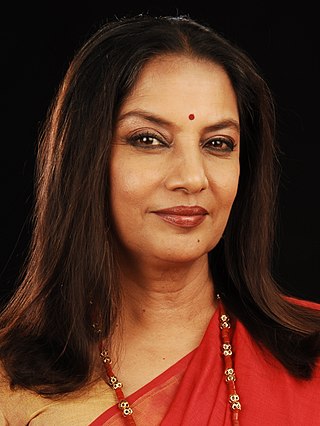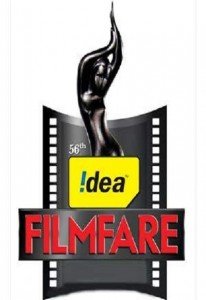
Bandini is a 1963 Hindi drama film directed and produced by Bimal Roy.It stars Nutan, Ashok Kumar and Dharmendra. The film tells the story of a woman prisoner serving life imprisonment for murder, Kalyani, the all suffering, selfless, sacrificing and strong, yet weak Indian woman. She must make a choice between two very different men, Devendra (Dharmendra), the loving prison doctor, and Bikash, a man from her past.

Nutan Samarth Bahl, known mononymously as Nutan, was an Indian actress who worked in Hindi films. In a career spanning nearly four decades, she appeared in more than 80 films, that ranged in genre from urban romances to socio-realist dramas. Regarded as one of the finest actors in the history of Indian cinema, Nutan was noted for her naturalistic acting style in parts of conflicted women often deemed unconventional. Her accolades include a record five Filmfare Awards for Best Actress. In 1974, Nutan received the Padma Shri, India's fourth highest civilian award.
The Filmfare Award for Best Film is given by the Filmfare magazine as part of its annual Filmfare Awards for Hindi films.

The Filmfare Award for Best Supporting Actress is given by Filmfare as part of its annual Filmfare Awards for Hindi films, to recognise a female actor who has delivered an outstanding performance in a supporting role. Although the Filmfare awards started in 1954, awards for the Best Supporting Actress category started the following year 1955.

Bimal Roy was an Indian film director. He is particularly noted for his realistic and socialistic films such as Do Bigha Zamin, Parineeta, Biraj Bahu, Devdas, Madhumati, Sujata, Parakh and Bandini, making him an important director of Hindi cinema. Inspired by Italian neo-realistic cinema, he made Do Bigha Zamin after watching Vittorio De Sica's Bicycle Thieves (1948). His work is particularly known for his mise en scène which he employed to portray realism. He won a number of awards throughout his career, including eleven Filmfare Awards, two National Film Awards, and the International Prize of the Cannes Film Festival. Madhumati won 9 Filmfare Awards in 1958, a record held for 37 years.

Sujata is a 1959 Hindi language Bimal Roy film. It stars Nutan and Sunil Dutt in lead roles, supported by Shashikala, Lalita Pawar, Sulochana Latkar and Tarun Bose. Based on a Bengali short story of the same name by writer Subodh Ghosh, the film explored the situation of caste in India. The music is by S. D. Burman and the lyrics by Majrooh Sultanpuri. It was entered into the 1960 Cannes Film Festival.
The 26th Filmfare Awards were held in 1979.
The 15th Filmfare Awards were held in 1968, celebrating the best in Hindi cinema in 1967.
The 13th Filmfare Awards were held in 1966, honoring the best in Hindi cinema in 1965.
The 12th Filmfare Awards were held in 1965.

The 56th Filmfare Awards were held on 29 January 2011 at the Yash Raj Studios in Mumbai, honouring the best in film for the year 2010. The nominations were announced on 13 January. The date of the function was unusual because generally the awards are hosted on the last Saturday of February. The date of the telecast is 6 February 2011.
The 6th Filmfare Awards were held in 10 May 1959, at Bombay, honoring the best films in Hindi Cinema for the year 1958.
The 4th Filmfare Awards were held on 5 May 1957, in Bombay, honoring the best films in Hindi cinema for the year 1956.
The 8th Filmfare Awards were held in Bombay to honor the best films in Hindi cinema in 1961.

The 1st Filmfare Awards were held on 21 March 1954, honoring the best in Hindi cinema in 1953.
Sudhendu Roy (1921–1999) was a noted Indian film director, art director and production designer in Hindi cinema, most known for his realistic art direction in auteur Bimal Roy's films, like Sujata (1959), Madhumati (1959) and Bandini (1963), and glitzy work in films Subhash Ghai's Karz (1980) and Karma (1986) to Yash Chopra's Silsila (1981), Chandni (1989) and Lamhe (1991). He won the Filmfare Award for Best Art Direction thrice for, Madhumati (1959), Mere Mehboob (1964) and Sagina (1975).
Kamal Bose (1915–1995) was an Indian cinematographer, who shot most of Bimal Roy classics, including Parineeta (1953), Do Bigha Zamin (1953), Bandini (1963), Devdas (1955) and Sujata (1960). He successful transitioned into the coloured film era, and shot Qurbani (1980), Janbaaz (1986) and Dayavan (1988).
The 2nd Filmfare Awards were held in 1955.
The 3rd Filmfare Awards were held in 1956.
The 7th Filmfare Awards were held in 1960.












